
In humankind’s relentless bid towards immortality, there has been growing appetite for research and development efforts towards combating ageing, and by extension, better life.
Vaccine against aging?
A recent study by Japanese scientists Masayoshi Suda, Ippei Shimizu, et al, dubbed as ‘vaccine against getting old’, suggests that may just take us a bit closer to that goal.
The study titled Senolytic vaccination improves normal and pathological age-related phenotypes and increases lifespan in progeroid mice explores how the vaccine helps remove ‘zombie cells’ that accumulate throughout our bodies as we age. Also known as senescent cells, they are known to cause inflammation, damage nearby cells and cause ageing-related illness and diseases such as Alzheimer’s.
The study conducted on mice shows “improved normal and pathological phenotypes associated with aging, and extended the male lifespan of progeroid mice.”
Scientific community weighs in
The scientific and research community has weighed in on the update shared by science communicator and producer Hashem Al-Ghaili.
Scientist, physician, and medical educator Dr Mark Brezinski, who spent over 30 years a Massachusetts General Hospital and Brigham and Women’s Hospital as board certified internal medicine and cardiology expert, weighs:
“This may have some effect on aging but aging mechanisms are far more complex. Much of what we attribute to aging isn’t actually from aging. The vaccine can address some injuries, but others will be unaffected.”
Dr Brezinski further explains:
“Evolutionary mismatch is likely the cause of arterial stiffening and the vaccine isn’t going to work. Hominids separated from apes about 7 million years ago and we progressed in our body design to be highly efficient hunter gathers. We walked 10 miles a day and eat a completely different diet. Then civilization hit and we began using our bodies differently than they were designed for. Atherosclerosis is a brick in general and acellular.”
In conclusion, he suggests that some parts of it may work, although it’s not the holy grail.
“The vaccine may help but won’t reverse the majority of it. We need to live a lifestyle close to what we were designed. Not sitting all day at a computer eating unhealthy food.”
Meanwhile, biotechnician Loubna Youssar from University of Freiburg, who specialises in establishing computational workflow to analyze RNA and comparing output from different conditions of growth, remains skeptical:
“I hope the “zombies cells” are not like “junk DNA” which turned out after few years of its naming is important as much as the “non-junk DNA”. Anyways, I don’t believe in miraculous product. Aging is natural and human needs to accept it. We can slow it down, but not avoid it.”
Longevity proponent, Dr Jaba Tkemaladze, who heads the department at Georgia Longevity Centre, welcomes the update:
“This is an excellent tool for cleaning decrepit cells. This improves the quality of life. But, unfortunately, this will not increase the rate of division of adult stem cells – the main reason for the aging and accumulation of these most decrepit cells is a decrease in the rate of division of adult stem cells.”
The possibility of significantly extending human lifespan with the aid of various technologies, or even achieving immortality, is a topic that has long fascinated and intrigued many of us.
While significant advances have been made in the fields of gerontology and aging research, the idea and possibilities of achieving immortality remains largely in the unknown realm of science.
Possibilities and concerns
The possibility of significantly extending human lifespan tends to draw two camps: those who are keen to explore the possibilities and those who raise concerns.
For example, if only some people had access to the technologies or treatments necessary to extend their lives, it could create significant inequalities and social tensions. There is also the question of how society would cope with a rapidly aging population if people were able to live significantly longer.
Ultimately, while the pursuit of longevity and immortality is likely to continue as aging in itself is a complex and multifaceted process that is not fully understood. Whilst the development is much welcome, any potential ‘vaccine against aging’ would need to address a wide range of factors and mechanisms in order for it to be fully effective.
This, along with many other recent research developments that are exploring the use of various therapies or interventions to delay or reverse certain aspects of aging, show promising signs towards our quest towards combating and delaying aging. Still, they are very much in the early stages of development and are yet been shown to be effective in humans.







